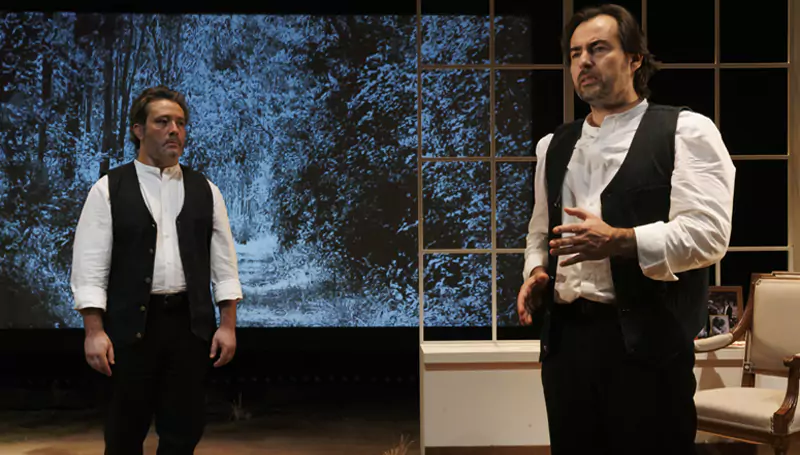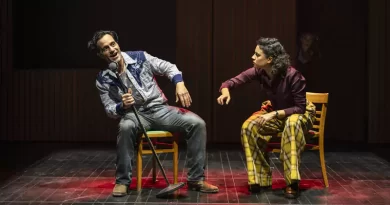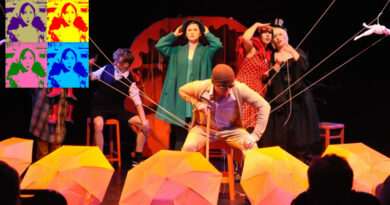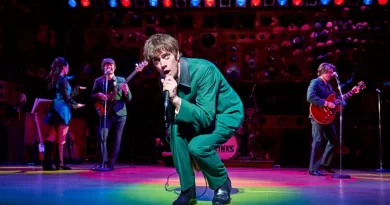“Wunschloses Unglück” (“A Sorrow Beyond Dreams”) by Peter Handke, at the Almada Theatre Festival
Dana Rufolo in Portugal
11 July 2025
A staged reading of Peter Handke’s 1972 novella Wunschloses Unglück – translated into Portuguese as Um Adeus Mais-Que-Perfeito – about his mother’s miserable life and her suicide at the age of 51 was one of the offerings of the Festival de Almada this year. It is an in-house production, directed by Teresa Gafeira of the Companhia de Teatro de Almada. Gafeira is Joaquim Benite’s widow.
A Sorrow Beyond Dreams is an ode to the mother Handke loved and was powerless to help. His Austrian mother from the poor agricultural region of Carinthia that borders Slovenia was a bright woman who had no chance to develop her skills and interests. Furthermore, her lifespan coincided with the rise of the Nazi state, World War Two and Austria’s annexation, and post-war austerity. Avoiding giving his mother a name, Handke traces her loves, whims, aspirations and frustrations during all those decades; herself apolitical, his narrative reminds us how war and its effects ripple into every corner of society, even villages far from the front. Not that his mother cared, for she was already subjected to domestic violence, scrimping, and indifference. We are told of a woman’s fate in a child’s ditty from that region that goes like this:
Tired/Exhausted/Sick/Dying/Dead.
Moments of joy in her life were rare although she was a carefree, laughing young woman when she ran away from home to go work in a German hotel. She fell in love with a married German soldier, and Peter Handke was the result of that love match; she married an abusive man for whom she felt little love and even less affinity so that Peter would have a father, and then she had several other children. They lived in Berlin initially but then moved back to her family home in Austria. From then on, she felt trapped. She suffered for years from a disease diagnosed as depression but which sounds suspiciously like Borreliosis to me. It left her permanently suicidal, and she deviously collected sleeping pills to end her life.
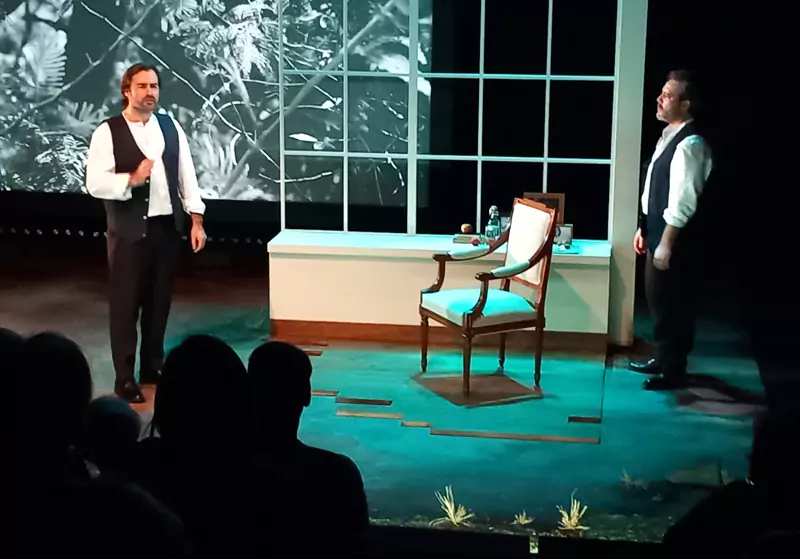
Photo credit: Axel Hörhager.
An implicit source of joy in her life, however, was her relationship with her firstborn child. They shared books and philosophical talks. Handke quotes from her letters which are eloquent and literary. Her letters tell of private sentiments: “I talk to myself, because I can’t say anything to other people any more. I feel like a machine … My husband is coming home on December 1 …I can’t see how it will be possible to live with him. We each look in a different direction and the loneliness only gets worse.” She announced her decision to commit suicide to her son, and although she wrote a farewell letter to every member of her family, it was to Peter that she sent her final letter, containing a copy of her will.
Wisely, Gafeira gave the performance – it is I and not she who calls it a staged reading – minimal input as director: a blank modern living room space at the rear wall of which is not a TV screen but rather photos or videos of natural scenes such as one finds in southern Austria; dense trees though which rays of sunlight occasionally beam, rows of long LED lights overheard that occasionally burst into colours and flick on and off to intensify references to war, dimmed lights to suggest night or darkness as a mood.
Taking turns, two actors from the Almada Theatre Company recite the lines: Duarte Guimarães and Pedro Walter. I was told that one of these two young men was more articulate and projected his voice better, but because it was in Portuguese and I was near the stage I can’t claim to have noticed a difference between them. They were fairly still while reciting. It upset critics and knowledgeable audience members to have seen two actors on stage performing the identical function, but as it was, each had memorized 30 minutes of text. I’d imagined one might be the equivalent of Handke the narrator and the other an interior private voice, perhaps the mother’s or perhaps Handke’s more insulate thoughts, but not at all. They recited extracts from the text in a continuous fashion; no psychological tricks, no interpretation. Pure Handke. Each wore an identical costume of black pants and shoes, a collarless white shirt and a vest that is a simplified version of the folkloric original.
Staged readings of books with a humanistic perspective are not new to the Almada Festival. The Almada Theatre’s actor Claudio da Silva read Primo Levi’s book If This Is a Man at the 2019 Almada festival. At last year’s festival, there was a staged reading of Entrelinhas (Between the Lines) by playwright Tiago Rodrigues and delivered by actor Tónan Quito. The play describes Rodrigues’s discovery of a letter written by a prisoner to his mother tucked inside the pages of a copy of Sophocles’ Oedipus that had come from a prison library.
A staged reading has the advantage of presenting text on stage in a livelier manner than is usual when the book is read out loud in front of spectators by the author who often is far from being a vocally-trained narrator. A second advantage of the staged reading of Handke’s book is that although the audience is listening to a translation, they are not subjected to a director’s interpretation. The words stand as the author wrote them, clear and impactful. The night I saw A Sorrow Beyond Dreams in the Experimental Theatre space of the Joaquim Benite theatre, there was a standing ovation.
Photograph at head of this article and as thumbnail is by Rui Mateus.

